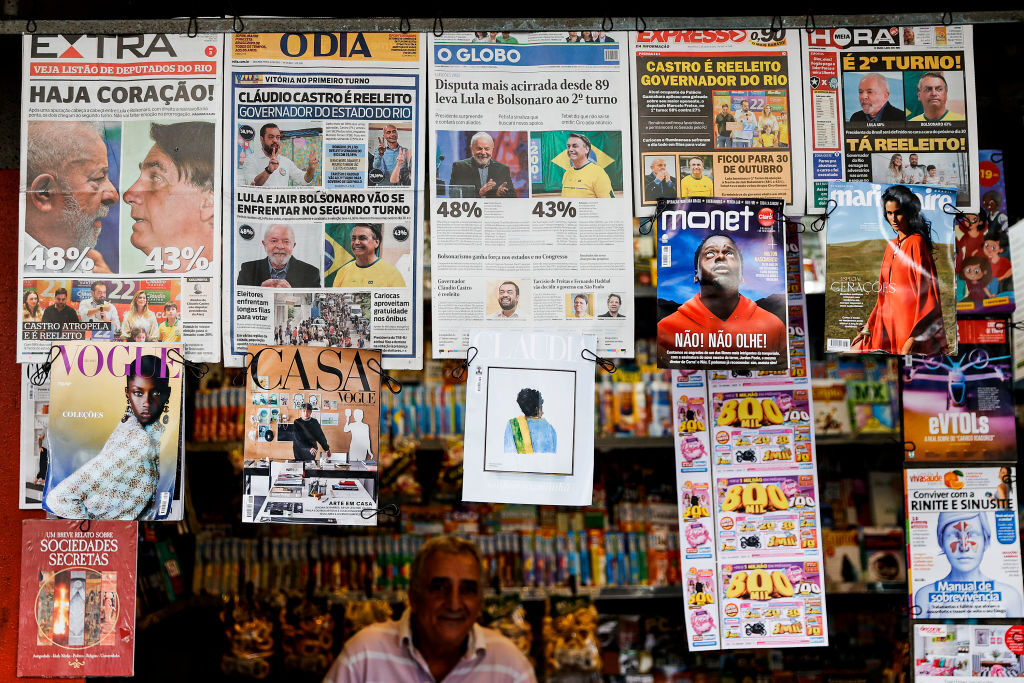China’s state-run Global Times propaganda newspaper lamented the results of the Brazilian presidential election on Monday, warning that conservative President Jair Bolsonaro significantly overperforming compared to national polls could lead to a “January 6”-style riot in Brasilia.
Bolsonaro came in second place in Sunday’s election, just five points behind frontrunner and former president Luiz Inácio Lula da Silva. Years of polling had indicated that Lula enjoyed outsized popularity nationwide; as recently as this weekend, a national poll showed Lula trouncing Bolsonaro by 14 points and crossing the 50-percent support threshold necessary to win the presidency.
In Brazil, a candidate must receive over 50 percent of votes to win the presidency in the first round. If no candidate hits the 50-percent mark, the top two vote-getters move on to second election in which they must court supporters of less popular candidates.
Lula received about 48 percent of the national vote on Sunday; Bolsonaro came in second place with 43 percent. The third and fourth place candidates received about seven percent of the vote and nearly 20 percent of voters abstained, leaving a much larger pool of potential voters for both candidates than the five-percent difference between them.
While both Lula and Bolsonaro have proven friendly to communist China – Bolsonaro had campaigned on curbing Chinese influence in the country but rapidly changed his tune upon being elected – Lula pioneered Brazil’s pivot to China during his presidency between 2003 and 2011 and is openly a hard-left socialist and friendly to Beijing’s ideology.
Lula was also in charge of the country during the events of “Operation Car Wash,” a national corruption scheme in which private contractors offered politicians of nearly every political party – including Lula – large bribes to ensure access to overpriced government contracts for public works projects.
The nation’s top court, the Supreme Federal Tribunal, allowed Lula to run for president despite being convicted and sentenced to 25 years in prison for bribery.

Brazilian newspapers are seen on a newsstand showing headlines a day after the general elections day which confirmed a runoff at the end of the month between Lula and Bolsonaro on October 03, 2022 in Rio de Janeiro, Brazil. (Buda Mendes/Getty Images)
Bolsonaro’s friendliness to communist dictator Xi Jinping did not protect him from the Global Times‘ criticism.
The Global Times lamented that Brazilians have the right to openly display political disagreements, a recurring theme in Global Times editorials, which generally promote totalitarian one-party rule as the epitome of human “harmony.” The tight political race, which occurred peacefully and both sides agree was free and fair, will likely prompt “political violence,” the Chinese government mouthpiece predicted.
“Chinese experts warned that the January 6 US Capitol Hill riot may repeat in Brazil,” the Global Times claimed, “but the largest emerging country in the southern hemisphere is expected to maintain friendly and cooperative relations with China, especially economic cooperation, no matter which party comes into office.”
The January 6, 2021, riot followed a rally in which President Donald Trump spoke; participants had accused election overseers, particularly in Democrat-run states, of fraud in the November 2020 election. Police killed one woman at the riot.
Brazilian President Jair Bolsonaro officially launched his re-election campaign in Rio de Janeiro on Sunday with a fiery speech condemning communism. https://t.co/ujn0dhjvMH
— Breitbart News (@BreitbartNews) July 25, 2022
“There is a possibility that Brazil could see the same version of the Capitol riot that followed the US presidential election in 2020,” a Chinese regime expert identified as “research fellow” Xu Shicheng said.
Xu and the publication did not offer any evidence for the prediction of political violence in Brazil other than the fact that the election results were close and that Bolsonaro maintains a friendly relationship with Trump – Trump personally endorsed Bolsonaro on Saturday. The Global Times also failed to mention the pivotal context that Bolsonaro was the victim of an assassination attempt a month before he won the presidency in 2018.
During a campaign rally in Minas Gerais state in 2018, a longtime member of the “Socialism and Liberty Party” approached Bolsonaro and stabbed him repeatedly in the abdomen, an attack caught on camera. Bolsonaro has sustained long-term damage from the assault, routinely needing checkups to ensure that scarring has not resulted in digestive malfunction.
Bolsonaro officially launched his reelection campaign in the city in which he has said he was “reborn.”

A supporter of Brazilian President and re-election candidate Jair Bolsonaro reacts as she watches the vote count of the legislative and presidential election, in Rio de Janeiro, Brazil, on October 2, 2022. (CARL DE SOUZA/AFP via Getty Images)
At the time, the Global Times did not cover the stabbing or express any concern about the rise of political violence in Brazil. A search of the Chinese propaganda outlet’s website shows that it did not cover Bolsonaro at all in 2018, including his victory in the presidential election.
Leftists have maintained violent behavior throughout Bolsonaro’s presidency, staging riots nationwide. Criminal organized gangs have also staged anti-Bolsonaro riots and looting events, leaving messages specifically attributing their behavior to opposition to Bolsonaro’s policies.
Rather than offering this context, the Global Times claimed Bolsonaro was likely to fuel violence, offering no evidence for the concern.
“Fear have [sic] also arisen among analysts that the far-right Bolsonaro, who idolizes Trump, may refuse to accept the result if he loses, paving the way for a January 6-style institutional breakdown in Latin America’s biggest country, according to Reuters report,” the Chinese outlet claimed.
Unlike the presidential race, gubernatorial and congressional races on Sunday indicated that Brazil was shifting significantly rightward. Bolsonaro’s Liberal Party and its allies now control a sizable majority of Congressional seats and conservatives took over the governorships of Sao Paulo and Rio de Janeiro, home to the country’s largest cities. At least nine former members of Bolsonaro’s cabinet are now federal lawmakers-elect.

COMMENTS
Please let us know if you're having issues with commenting.